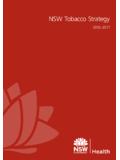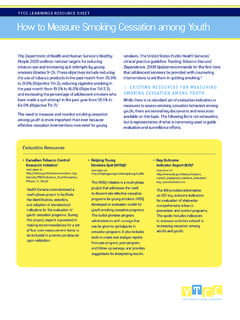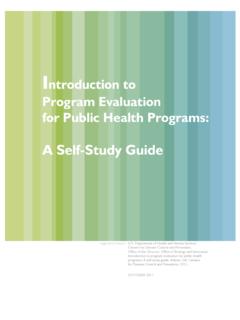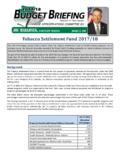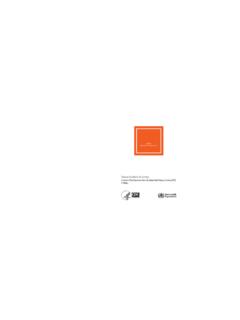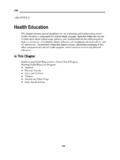Transcription of Guidelines for implementation of Article 5.3 of the …
1 Guidelines for implementation of Article of the WHO Framework Convention on tobacco control on the protection of public health policies with respect to tobacco control from commercial and other vested interests of the tobacco industry INTRODUCTION. 1. World Health Assembly resolution on transparency in tobacco control process, citing the findings of the Committee of Experts on tobacco Industry Documents, states that the tobacco industry has operated for years with the express intention of subverting the role of governments and of WHO in implementing public health policies to combat the tobacco epidemic . 2. The Preamble of the WHO Framework Convention on tobacco control recognized the Parties' 1 need to be alert to any efforts by the tobacco industry to undermine or subvert tobacco control efforts and the need to be informed of activities of the tobacco industry that have a negative impact on tobacco control efforts.
2 3. Further, Article of the Convention requires that in setting and implementing their public health policies with respect to tobacco control , Parties shall act to protect these policies from commercial and other vested interests of the tobacco industry in accordance with national law . 4. The Conference of the Parties, in decision FCTC/COP2(14), established a working group to elaborate Guidelines for implementation of Article of the Convention. 5. Without prejudice to the sovereign right of the Parties to determine and establish their tobacco control policies, Parties are encouraged to implement these Guidelines to the extent possible in accordance with their national law. Purpose, scope and applicability 6. Use of the Guidelines for implementation of Article of the Convention will have an overarching impact on countries' tobacco control policies and on implementation of the Convention, because the Guidelines recognize that tobacco industry interference, including that from the State-owned tobacco industry, cuts across a number of tobacco control policy areas, as stated in the Preamble of the Convention, articles referring to specific tobacco control policies and the Rules of Procedure of the Conference of the Parties to the WHO.
3 Framework Convention on tobacco control . 1. The term Parties' refers to States and other entities with treaty-making capacity which have expressed their consent to be bound by a treaty and where the treaty is in force for such States and entities. (Source: United Nations Treaty Collections: #signatories). 1. 7. The purpose of these Guidelines is to ensure that efforts to protect tobacco control from commercial and other vested interests of the tobacco industry are comprehensive and effective. Parties should implement measures in all branches of government that may have an interest in, or the capacity to, affect public health policies with respect to tobacco control . 8. The aim of these Guidelines is to assist Parties2 in meeting their legal obligations under Article of the Convention. The Guidelines draw on the best available scientific evidence and the experience of Parties in addressing tobacco industry interference.
4 9. The Guidelines apply to setting and implementing Parties' public health policies with respect to tobacco control . They also apply to persons, bodies or entities that contribute to, or could contribute to, the formulation, implementation , administration or enforcement of those policies. 10. The Guidelines are applicable to government officials, representatives and employees of any national, state, provincial, municipal, local or other public or semi/quasi-public institution or body within the jurisdiction of a Party, and to any person acting on their behalf. Any government branch (executive, legislative and judiciary) responsible for setting and implementing tobacco control policies and for protecting those policies against tobacco industry interests should be accountable. 11. The broad array of strategies and tactics used by the tobacco industry to interfere with the setting and implementing of tobacco control measures, such as those that Parties to the Convention are required to implement, is documented by a vast body of evidence.
5 The measures recommended in these Guidelines aim at protecting against interference not only by the tobacco industry but also, as appropriate, by organizations and individuals that work to further the interests of the tobacco industry. 12. While the measures recommended in these Guidelines should be applied by Parties as broadly as necessary, in order best to achieve the objectives of Article of the Convention, Parties are strongly urged to implement measures beyond those recommended in these Guidelines when adapting them to their specific circumstances. GUIDING PRINCIPLES. Principle 1: There is a fundamental and irreconcilable conflict between the tobacco industry's interests and public health policy interests. 13. The tobacco industry produces and promotes a product that has been proven scientifically to be addictive, to cause disease and death and to give rise to a variety of social ills, including increased poverty.
6 Therefore, Parties should protect the formulation and implementation of public health policies for tobacco control from the tobacco industry to the greatest extent possible. 2. Where appropriate, these Guidelines also refer to regional economic integration organizations. 2. Principle 2: Parties, when dealing with the tobacco industry or those working to further its interests, should be accountable and transparent. 14. Parties should ensure that any interaction with the tobacco industry on matters related to tobacco control or public health is accountable and transparent. Principle 3: Parties should require the tobacco industry and those working to further its interests to operate and act in a manner that is accountable and transparent. 15. The tobacco industry should be required to provide Parties with information for effective implementation of these Guidelines .
7 Principle 4: Because their products are lethal, the tobacco industry should not be granted incentives to establish or run their businesses. 16. Any preferential treatment of the tobacco industry would be in conflict with tobacco control policy. RECOMMENDATIONS. 17. The following important activities are recommended for addressing tobacco industry interference in public health policies: (1) Raise awareness about the addictive and harmful nature of tobacco products and about tobacco industry interference with Parties' tobacco control policies. (2) Establish measures to limit interactions with the tobacco industry and ensure the transparency of those interactions that occur. (3) Reject partnerships and non-binding or non-enforceable agreements with the tobacco industry. (4) Avoid conflicts of interest for government officials and employees.
8 (5) Require that information provided by the tobacco industry be transparent and accurate. (6) Denormalize and, to the extent possible, regulate activities described as socially responsible by the tobacco industry, including but not limited to activities described as corporate social responsibility . (7) Do not give preferential treatment to the tobacco industry. (8) Treat State-owned tobacco industry in the same way as any other tobacco industry. 18. Agreed measures for protecting public health policies with respect to tobacco control from commercial and other vested interests of the tobacco industry are listed below. Parties are encouraged to implement measures beyond those provided for by these Guidelines , and nothing in these Guidelines shall prevent a Party from imposing stricter requirements that are consistent with these recommendations.
9 3. (1) Raise awareness about the addictive and harmful nature of tobacco products and about tobacco industry interference with Parties' tobacco control policies. 19. All branches of government and the public need knowledge and awareness about past and present interference by the tobacco industry in setting and implementing public health policies with respect to tobacco control . Such interference requires specific action for successful implementation of the whole Framework Convention. Recommendations Parties should, in consideration of Article 12 of the Convention, inform and educate all branches of government and the public about the addictive and harmful nature of tobacco products, the need to protect public health policies for tobacco control from commercial and other vested interests of the tobacco industry and the strategies and tactics used by the tobacco industry to interfere with the setting and implementation of public health policies with respect to tobacco control .
10 Parties should, in addition, raise awareness about the tobacco industry's practice of using individuals, front groups and affiliated organizations to act, openly or covertly, on their behalf or to take action to further the interests of the tobacco industry. (2) Establish measures to limit interactions with the tobacco industry and ensure the transparency of those interactions that occur. 20. In setting and implementing public health policies with respect to tobacco control , any necessary interaction with the tobacco industry should be carried out by Parties in such a way as to avoid the creation of any perception of a real or potential partnership or cooperation resulting from or on account of such interaction. In the event the tobacco industry engages in any conduct that may create such a perception, Parties should act to prevent or correct this perception.










